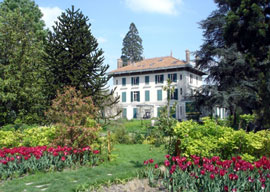
January 26, 2014

Musée de l"histoire vivante
Why, you might ask, did I go to such trouble to visit the Musée de l”Histoire vivante? It is a long and not very interesting story. A little while back I bought in a secondhand bookshop a book published in 1925 by a man called Paul Monet with a dedication from him to a friend. The friend was obviously not very interested in M. Monet’s thoughts because the pages were still uncut. The book was about French colonialism in Indochina, and Paul Monet was not complimentary about his countrymen who lived there, regarding them as mentally idle, economically exploitative, and politically inept, and who were blindly leading France to disaster. As it happened, there was an exhibition of photographs of Vietnam at the Musée and among them were those taken in the 1920s by Monet, who is now an all but forgotten figure. In spite of his strictures, he was a believer in the French mission civilisatrice, a very odd idea with regard to a country with an immemorial, highly refined, and delicate civilization, but which Monet sincerely held. I had already in mind an article about the dual nature of the French attitude toward Indochinese culture, society, and civilization, with respectful savants on the one hand (the minority) and disdainful colonial types on the other.
The Musée was founded in 1939 by the French Communist Party to spread the mixture of truths, half-truths, and lies, both of commission and omission, of its own historiography. It has remained true to its roots; it was in a nineteenth-century building, ill lit, uncared for, and slovenly in its arrangement. I, being the only visitor, was outnumbered by the staff: a man at the gate, so unused to labor of any kind that he took a long time to press the button to open it, which he did reluctantly and in slow motion, as if moving through atmospheric treacle; and the guardian of the museum itself, whose doors were locked though it was officially opening time, and who let me stand in the rain for a period just to check that I really wanted to enter. I had interrupted his conversation on a mobile telephone in an African language, and when I gave him 10 euro for the 2-euro entry fee, he sighed as if I had given him an immense task to perform.
The pre-independence pictures were interesting; there was nothing propagandistic about them. Indeed, the Vietnamese in them looked singularly depressed; they were no advertisement for the colonial regime. After independence, all was smiles and happiness: nothing about the reeducation camps, the millions of boat people, or anything like that. Upstairs, on the wall of the landing, unlit, was a badly executed fresco of Karl Marx surrounded by his family. There was nothing here about the tragic fate that befell the children of the great apostle of mankind’s future perfect happiness.
If ever you feel nostalgia for the Eastern Europe of the good old days, go to Montreuil!